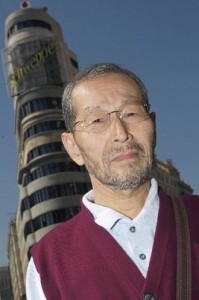Memory Without Borders: ARMH (1)
Editor’s note: This is the first in a series of three articles about the work of the Asociación para la Recuperación de la Memoria Histórica (ARMH), a grassroots Spanish organization helping the victims of Francoism in their pursuit of truth, justice and reparations. Click here for the second and third.
In early January, El País published a very moving article about one of many international volunteers who work with the Association:
 For three months, the family of Antonio Castro, who lives in the town of As Pontes in La Coruña, [Galicia, Spain] hadn’t received any signs of life from Toru Arakawa. This Japanese friend usually responded quickly to all the messages they would send him from Galicia, usually asking him for advice on how to take care of the bonsai that Toru had given them in 2006.
For three months, the family of Antonio Castro, who lives in the town of As Pontes in La Coruña, [Galicia, Spain] hadn’t received any signs of life from Toru Arakawa. This Japanese friend usually responded quickly to all the messages they would send him from Galicia, usually asking him for advice on how to take care of the bonsai that Toru had given them in 2006.
At the end of the year, worried about this silence, the Castros phoned Toru’s son, who lives in Chicago. And the son told them that Toru had died of a heart attack in Nilgata, Japan on October 5. “Please forgive me. I don’t have the password of my father’s e-mail and I haven’t been able to respond to his messages. He had a bad heart condition but he didn’t want us to tell anyone.”
Above all, Toru Arakawa didn’t want people in Spain to know about his condition. Like he had done every year since he worked on the first Spanish Civil War mass grave, he was planning to work again this summer with the Association for the Recovery of Historical Memory, based in Ponferrada, or any other group involved in the Cause.
Toru Arakawa was the Japanese Friend of Memory. In 2006, the year that he gave that bonsai to the Castro family, he fulfilled a lifelong dream. He had spent more than a decade preparing himself for the trip to Spain. First, with the Spanish-language tapes that he would listen to each morning, then with the Manolito Gafotas books, and later with Lorca, Machado and many essays about the Spanish Civil War. He was a 68 year-old retired English teacher when he read in a Japanese newspaper an article about the first Spanish Civil War mass graves that were being exhumed in Spain. The article spoke about the Association for the Recovery of Historical Memory in Ponferrada…
He travelled 20,000 kilometers and showed up in Ponferrada with the Japanese newspaper clipping in hand. A few days later, he began to work as a volunteer at a mass grave in As Pontes. The first remains he helped recover were four skeletons, belonging to the Ramos Ferreiro family; a married couple and their two children, killed in their own home by Falangists. The couple’s wedding bands were still there, encircling what was left of the bones of their ring fingers. Toru cried like a child when he saw that family, and ever since, he has helped in as many exhumations as he could.
The day that the families of the disappeared turned in to Judge Garzón the list of Francoist victims –143,353 names—Toru had traveled to Madrid, to the entrance of the National Court, just to watch. It was something he did not want to miss…












